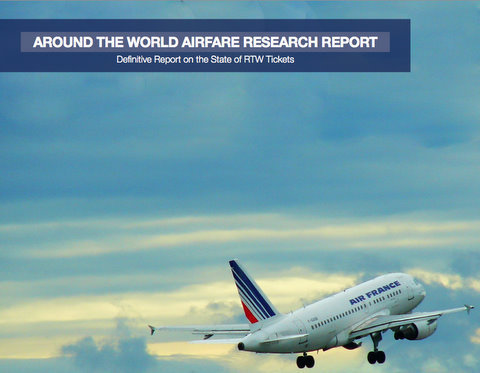Rolf Potts's Blog, page 103
March 16, 2012
Pre-trip planning, post #4: technology
Vagablogging :: Rolf Potts Vagabonding Blog
This post is the fourth in a series on pre-trip planning (see the Intro, post #1: research, post #2: travel insurance, and post #3: gear).
When I think of how technology has improved the way I travel, two words instantly come to mind: Dropbox and Kindle.
Dropbox, for those of you who are not familiar with the service, is a way to back up files and sync them across all your devices (laptop, desktop, netbook, iPad, iPhone, etc). It's changed the way I work—gone are the days of bulky email attachments and multiple backup drives—and it's also changed the way I travel.
At the start of a trip, I'll create a new folder, say, "Portugal 2012." In it I'll put any relevant files: the Lonely Planet Portugal guidebook, travel insurance information, flight and hotel confirmations, and a .doc file full of notes. I'll sync the folder to my iPhone (or to whatever device I'm traveling with) and while I still have internet access I'll "favorite" the files by clicking on the star when the file is open. This saves the file to the iPhone's hard drive and allows me to open it later, even if I don't have an internet connection. Also, all the files are also backed up on the Dropbox website and accessible via the internet.
If you don't have Dropbox yet, sign up! The first 2GB of storage are free, and if you sign up through my referral link here we'll both get an extra 250 MB of space.
My second favorite piece of travel technology is the Kindle, Amazon's ebook reader. It's a godsend for long treks and cycling trips: instead of lugging around heavy books, I can load up on dozens of e-books and have enough to read for weeks. While the iPad is certainly a more beautiful and intuitive item, the Kindle wins out in terms of battery life and cost.
In terms of other technology: for internet access, I usually travel with a netbook, though on this trip it's starting to feel sorely inadequate–it's too hard for me to do any significant writing on this tiny screen. Still, you can't beat the netbook's $250-$350 price tag for a keyboard, screen, and over 14 hours of battery life. For quick access to emails, I usually use my iPhone. I don't find that the camera is adequate for travel photos, so I usually bring my trusty Canon Powershot SD, along with a few extra batteries.
Finally, no post about travel technology would be complete without mentioning Skype. It's a great way to stay in touch with friends, family and colleagues wherever you are, and I've found that it works even on super-slow internet connections.
If you have any other travel technology tips, feel free to share them in the comments below!
Original article can be found here: Pre-trip planning, post #4: technology
March 15, 2012
Vagabonding as a rock musician: a step by step guide. Introduction.
Vagablogging :: Rolf Potts Vagabonding Blog

Photo credit http://frasesdavida.wordpress.com
Most people will never understand the thrill of being on a stage because, actually, they have never been. That complex array of mixed emotions, gut feeling and embarrassment which sometimes spawns some of the World's greatest awesomeness may be related to travel in many ways.
As I previously wrote , by bringing an instrument on your travels you may enhance the chances of casual encounters with locals, volunteer opportunities, earn some money as you go and many other serendipitous experiences making a trip much more worth remembering.
But… what about those people who are actually travelling by playing music? What about the touring artists? They do get to travel, yes. A lot. And the best part is… they get paid for it!!
The role of the musician in today's society is generally misunderstood, placed on a superior level, a better niche, and is generally perceived as something we may never get to attain. Well… deadly wrong, my friends. Playing music and get to travel is easier than you would think, if your expectations remain in the realm of realism. Because Woodstock and the 70s, unfortunately, are long gone in the sands of mythology and times…
I decided to start writing a series of posts to help those with a musical penchant to analyze their skills, organize them into a musical product, and take it out on the road by touring… and consequently get to travel the world in an amazingly different way.
How many times have you wandered the streets of most European and American cities, visiting different bars, and asking yourself how could that terrible guitarist get to strum those elementary notes on a stage, drunk, and just plain mediocre? If such people get a chance to express themselves, why should not you, a skilled, enthusiastic musician, get to do the same?
Because you do not know how, possibly. Because the music business still remains one of the least accessible cast systems in the show business… possibly alike to literary circles, but with a bigger emphasis on the egos, the booze, and the mayhem. And most times, believe me, when you get into those circles, you will understand that you CAN DO much better than most of them.
So, if you have dreamed about packing that guitar/ukulele/flute/keyboard/saxophone and taking it out on the road, driving long distances in vans crammed with people, sleeping on the floors of total strangers who have become your new best friends after a night of musical entertainment – and possible drunk mayhem -, getting to know the insights of the World's furthest corners' youth cultures, and making a lot of friends –and boy/girlfriends – along the way… well, if you really DID dream about this, tune up your RSS feed on Vagabonding because from this week onwards, and sometimes sporadically, you will find a wealth of useful information.
Now, go back to the bed, and keep practicing on the guitar!!! Because nothing in this World comes without effort… and this is the bottom line of this introduction, and Lesson Number One.
Original article can be found here: Vagabonding as a rock musician: a step by step guide. Introduction.
Life changing travel moments
Vagablogging :: Rolf Potts Vagabonding Blog

front gate of the corrals at Ario Beach
Many moons ago I was flown to the Nicoya Peninsula in Costa Rica to evaluate a business plan for horse tours on a 2,024 hectare family owned ranch. It has mangroves, jungle, two river estuaries and 3.5 km of undeveloped shoreline. The family was in the beginning stages of protecting a good chunk of that land as a nature preserve and wildlife refuge. At the time I knew very little about managing large scale horse operations. Back home I was spoiled. We had accessibility to good feed, vet care and certified farriers. Riding horses along the beach is a romantic notion for many and I was no different. Heading for stables where the front gate was set only a few feet from high tide line had my mind souring with excitement. The gap is often vast between what we imagine about a place and what our experience truly is. So after three plane flights followed by a 45 minute taxi ride over molasses covered dirt roads we arrived on the sands of Ario beach beneath a vaulted ceiling of stars. What I saw over the next two weeks changed the current path I was on.
When someone says "paradise" what image comes to your mind?
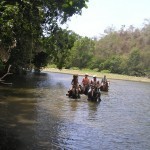
crossing the Bongo River
My mind paints a warm, pristine beach with inviting waters; which is exactly what the Ario Ranch seemed like at first glance. But quickly that dreamy veneer was peeled back as I watched two cowboys shoe a gelding. The animal awkwardly tried to balance on three other hooves. Metal shoes, too small for his feet, got nailed on using the improper size nails. This will cause the head of the nails to protrude and create cleats. Those cleats catch on terrain and make the hole in the hoof wall larger and can lead to infection or lameness. But improper shoeing creates a whole other set of problems too. A horses' heart alone isn't large enough to circulate all of its blood throughout its body. A horse must move to keep healthy circulation. Blood is forced back up the limb by the pooling of it in the sponge like coffin bone. But the steel shoes on this gelding weren't set properly which did restrict blood flow and can lead to bruising. I knew as it was happening that it wasn't right. Yet at that moment my lack of language skills and ability to do it myself, held me back from saying anything.
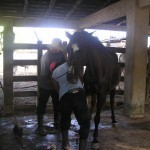
putting shoes on the gelding
As time progressed; I noticed the ranch hands had to rope horses for saddling rather than simply walking up and putting a halter on them. I discovered a horse with a vampire bat wound but no one seemed concerned about treating it. And in regards to the knowledge of horse care in the area the local vet said, "They [the people] just don't know better." Altogether these things shorten the animals' life span substantially.
The whole experience left me feeling helplessly inadequate with horse skills and wanting to learn more. The wheels in my head started turning. I spent the next several years working with large herds of horses, learning how to manage ranches, study and apply natural horsemanship, volunteer to care for injuries, learn to shoe, and studied equine chiropractic and massage.
Now all those skills will be put to the test. Two weeks ago I was asked to help organize a large scale equine event in Mongolia. While I don't know everything about horses, at least I know much more than I did seven years ago standing at the corral watching that gelding get shoes.
Have you even had a moment while traveling that set you in motion down an unexpected path?
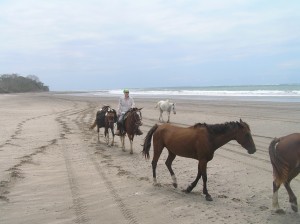
training a young mare
Original article can be found here: Life changing travel moments
March 14, 2012
Vagabonding Case Study: Emile Baizel
Vagablogging :: Rolf Potts Vagabonding Blog
Emile Baizel
Age: 35
Hometown: San Francisco, CA
Quote: "Be open to anything. And you do that by not planning so much."
How did you find out about Vagabonding, and how did you find it useful before and during the trip?
A friend of mine turned me onto the book after I had quit my job in early 2008 and was debating what to do next. The book inspired me to take a longer trip and I flew to Spain to walk the Camino de Santiago, something I had dreamt of doing for the past ten years, as well as trekking in the Sahara desert with just a camel and a guide.
After returning from this six week trip I realized that what I really wanted and needed to do was to continue finding adventures and traveling. I returned to San Francisco for a brief stint, moved out of my place, sold most of what I owned, and bought a one way ticket to India that fall. On this second trip I traveled for over 14 months.
How long were you on the road?
14 months. September 2008 through November 2009.
Where all did you go?
Spain, Morocco, India, Nepal, Singapore, Australia, Indonesia, Thailand, Laos, Cambodia, Jordan, Syria
What was your job or source of travel funding for this journey?
I was a Product Manager at a software startup and had always saved money over the years in case I wanted to take time off at some point. My landlord also offered to buy me out of my lease since the apartment was rent controlled so that was a good wad of travel money. And once I became a pro at budget traveling I could make a dollar go a long way. I also earned $10 as an extra in a Bollywood film!
Did you work or volunteer on the road?
Yes. I lived at and volunteered for two months at the Happy Home Nepal orphanage outside of Kathmandu, Nepal. I helped the twenty children with their English and Math homework and also built the happyhomenepal.org website and improved their SEO, all to help with getting donations and raising awareness of the orphanage to other volunteers.
Of all the places you visited, which was your favorite?
Man this is tough. The Camino de Santiago was a very special trip for me. As far as places, the remote areas of the Indian Himalayas would have to be my favorite. The landscape and the Tibetan-influenced culture is like nothing I have seen or experienced anywhere else. Seeing how people live off the land in high altitudes is quite amazing. Nepal is a very close second. Warm people, beautiful temples and world class mountain trekking.
Was there a place that was your least favorite, or most disappointing, or most challenging?
Singapore. I was planning on staying a few days before continuing on to Australia, but I got bored after half a day. After coming from India and Nepal where everything is an adventure, Singapore felt so stiff and sterile. I left the following day. It seems like a comfortable place to live, but not so much for traveling.
Did any of your pre-trip worries or concerns come true? Did you run into any problems or obstacles that you hadn't anticipated?
I had a couple of concerns. Getting gravely ill and being alone. I was worried about getting nasty stomach problems in India and aside from a few minor discomforts, I never got it bad. And I even swam in the Ganges in Varanasi and survived. I was also worried about being alone, and not meeting people. This couldn't have been further from the reality. I met travelers in every village, town or city that I went to and in my first couple of weeks in India, made some great friends who I would travel with for a couple of months. A group I became very close with reunited at one of the guy's weddings this spring in Mexico.
Which travel gear proved most useful? Least useful?
Most useful: Ziplock bags! So underrated yet so useful.
Least useful: most of the stuff I bought at sporting goods stores here in the U.S. I did a few long distance and challenging hikes in Nepal, including the Annapurna Circuit and Everest Base Camp. I brought everything that I needed for those hikes with me to Nepal, but that was a mistake as most of the items could be bought for much cheaper in Pokhara and Kathmandu. Specifically, boots and sleeping bags should be purchased in the U.S. Everything else should be bought in Nepal. And it helps their economy.
What are the rewards of the vagabonding lifestyle?
Oh man, just that feeling of being alive!! It's a feeling of adventure you simply can not replicate at home. At the start of my trip I was quite timid in terms of how I traveled. I planned everything well ahead, booked hotel rooms, reserved seats on buses. After about a month, I simply stopped planning ahead and just figured things out as I needed to. It gave me a lot more freedom and flexibility with where I went and how I got there.
As an example, I and a couple of other backpackers decided we would hitchhike across Cambodia instead of taking buses. There becomes a sort of 'backpacking circuit' in southeast Asia that is easy to fall into and we wanted to do something a bit different. We crossed the Laos border on foot and for a couple of hours it was not looking promising as no one was offering us a ride. But soon enough this long flatbed truck pulls up and in exchange for helping them roll some tree trunks onto the truck, they gave us a ride from the Laos border to Siem Reap. That was probably the ultimate 'vagabonding' experience for me. A year before that, sitting behind my desk in my office, I would not have thought in a million years I would be hitchhiking in Cambodia.
What are the challenges and sacrifices of the vagabonding lifestyle?
You don't always have a comfortable bed, or a clean, odor-free bathroom when you need it. That's the reality. But you'll get over it. The locals deal with it everyday. Although the one time that I had to run to the bathroom and realized I forgot to bring my toilet paper with me. That was not such a great moment.
I missed talking to friends and family, and also having my own kitchen. And good Mexican food. You just can't find good Mexican food abroad.
What lessons did you learn on the road?
Be open to anything. And you do that by not planning so much. Have a general idea of where you want to go, but allow room for spontaneity in the journey. Also, comfortable and more expensive travel never equals more fun. It's usually the opposite. Traveling in the General seating class on an overnight train in India is an unparalleled experience. There are people covering every square inch of the floor, and some guy is asleep resting his head on your knee while a chai vendor is making his way through the crowded car stepping over people while a guy sitting in the luggage rack above you is asking you if you could sponsor him to work in the U.S. because he'd be a really good doctor.
You also start to realize that what seems so important at home is not so important once you leave home. For example, where I live, in San Francisco, the media is always buzzing about Facebook and Twitter and when the next iPhone is coming out. When you're hiking at 15,000 feet altitude in the Himalayas, people there are concerned with how much cow dung they can save up to keep their fires burning through the winter.
How did your personal definition of "vagabonding" develop over the course of the trip?
For me, "vagabonding" meant doing things off the beaten path as much as I could. I began skipping the bigger cities in favor of a smaller village or a more remote destination I had heard about.
If there was one thing you could have told yourself before the trip, what would it be?
Be diligent about journaling and taking pictures. I wrote pretty frequently but I wish I had kept a daily journal. So much happens day to day and you think you'll never forget it. The big stories will always be in your mind but it's the small details that can fade away. Taking lots of pictures, especially of people you encounter, helps with this too.
Any advice or tips for someone hoping to embark on a similar adventure?
Embrace the unknowns. As a first time long term traveler, there are so many questions you'll have. Certainly do your research but don't overdo it. You will meet other travelers who will share their experience and stories with you and those will inspire your next journey. Have a general sense of what you want to do (I'd like to volunteer, I'd like to learn surfing, I'd like to study Buddhism) and see where there are good places to do those things. Then your trip becomes the adventure you embark on to get to that place and then engaging in the activity you had set out to do.
When and where do you think you'll take your next long-term journey?
I've never been to South America and only visited parts of Central America. I'd like to take several months and ride my motorcycle from my home in San Francisco and travel across Central and South America to the southern most point of Chile.
Website: emilebaizel.wordpress.com
Are you a Vagabonding reader planning, in the middle of, or returning from a journey? Would you like your travel blog or website to be featured on Vagabonding Case Studies? If so, drop us a line at casestudies@vagabonding.net and tell us a little about yourself.
Original article can be found here: Vagabonding Case Study: Emile Baizel
Seeing beyond the pre-trip to do list
Vagablogging :: Rolf Potts Vagabonding Blog
Last week, So Many Places posted this biggest, baddest RTW to do list, an extensive task list beginning a year before departure. I imagine this will be very helpful to many planners and am happy to see this information available.
As evidenced by this list, there's a lot involved in planning a trip – and most of it doesn't actually involve "planning a trip" but rather tying up loose ends from your current life and starting a new one. It can be extremely overwhelming, especially when considering that each item actually involves numerous tasks; for example, finding travel insurance involves hours of research and dozens of phone calls and emails.
I remember being in the thick of all this just a couple months ago, poring over details of global medical insurance and travel visas and flight coordination, wondering how other travelers have done it. I found myself getting so bogged down in details that I was solely focused on checking items off the list and losing sight of the purpose behind it all.
That's why there's one task I would recommend adding to this pre-trip list – a task that should precede all others: Write down the goals or reasoning behind your trip. I found that referencing this really helped motivate me through all the planning hassles.
I also discovered a few other strategies. First, I learned to accept the challenges as part of the process: If following dreams was easy, everybody would do it. Dealing with the naysayers and difficulties is simply a natural part of doing something extraordinary.
I also referred to the 4-step encouragement mantra of Chris Guillebeau, the writer behind The Art of Nonconformity:
I can do it.
I could always have a regular life somewhere.
But I've chosen a different path.
And I won't give up.
Interestingly, Guillebeau's post on this, Ever feel like giving up?, was written in July 2008 and remains in the top 10 most popular posts on his blog. Clearly this is a topic long-term travelers can relate to even while on the road.
Lastly I began collecting quotes that I found inspirational, and I would refer to them when I became discouraged. Here are some that I think relate more specifically to the planning process:
Whatever you do, you need courage. Whatever course you decide upon, there is always someone to tell you that you are wrong. There are always difficulties arising that tempt you to believe your critics are right. To map out a course of action and follow it to an end requires some of the same courage that a soldier needs. Peace has its victories, but it takes brave men and women to win them. – Ralph Waldo Emerson
An adventure is only an inconvenience rightly considered. An inconvenience is only an adventure wrongly considered. – G. K. Chesterton
A man would do nothing if he waited until he could do it so well that no one would find fault with what he has done. – Cardinal Newman
You have to leave the city of your comfort and go into the wilderness of your intuition. You can't get there by bus, only by hard work and risk and by not quite knowing what you're doing. What you'll discover will be wonderful. What you'll discover will be yourself. – Alan Alda
All great changes are preceded by chaos. – Deepak Chopra
Travelers, what's your advice for first-time planners? Planners, what do you do to make it through the hassles?
Original article can be found here: Seeing beyond the pre-trip to do list
March 13, 2012
Americans of Generation Y: Are we the "Go-Nowhere Generation?"
Vagablogging :: Rolf Potts Vagabonding Blog
Recent buzz around the web has suggested big changes in travel, but these trends are much more complicated than gradual increases in tourism as discussed last week by Chris and Marco. 
Generation Y, is that you? Photo from CNN
We know we can expect at least one billion tourists by 2012, but not everyone is joining the great migration.A controversial New York Times article suggests quite the opposite for Americans of Generation Y. It suggests that Americans born after 1980 have become "risk-averse and sedentary," more conditioned to slouching instead of moving forward. We've been dubbed the "Go-Nowhere Generation," with more of us living at home, checking Facebook and waiting for the economy to change instead of moving to places where we may be better off.
While some of the reasons for less movement (economic downturn, student debts, technology addictions?) ring true, I can't agree with the vague generalizations of America's young people. Traveling for better opportunity is less common not just because we're stuck tweeting in front of the TV! Tom Joad and his family did indeed travel half of the US for a sunnier economic climate, but twenty and thirty-somethings in America are living under much different circumstances than the Joads of the 1930s. In this great recession, it's the housing crisis, low wages and debt that encourage staying put instead of breaking free like the Joads. Hard working adventurers and idealists of the past headed west to farm, moved to Alaska to log, and bolted to Las Vegas to join the burgeoning casino industry. By 2009, most cities in the "top 10″ list for opportunity became those that were hit hardest by the crumbling economy.
But what about the lingo of Generation Y? An increased popularity of the word "random" contributing to young Americans relying on luck instead of effort? I don't think so. It's doubtful that the Disney Channel show "So Random" has much of an influence on the American psyche. And can we be sure that Facebook plays a leading role in the declining number of US drivers licenses being issued?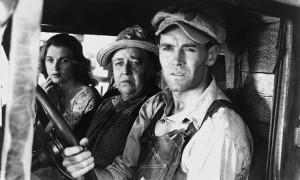
The Joads' Jalopy: photo from The Guardian
It's a tough economy in the US and outside of it. It's true that many young Americans are emerging from the standstill, and are simply underemployed and drowning in student debts which may lead to more local living. The root causes of this slowed travel phenomenon are more complicated than I know, but I can assure you that any inclination to lazily live at home and depend on "luck over effort" isn't a result of a Disney Channel slogan.
What do you think? As like minded readers sharing a passion for travel, why do you think American young adults are in a migratory standstill? Do you think the same rules apply to other countries of Gen Y?
Original article can be found here: Americans of Generation Y: Are we the "Go-Nowhere Generation?"
What are dreams? And can we live them?
Vagablogging :: Rolf Potts Vagabonding Blog
I was a guest on The Breaking Free Show with Marilyn Shannon tonight. We were talking about freedom and breaking free from the ideas and mindsets that keep us captive.
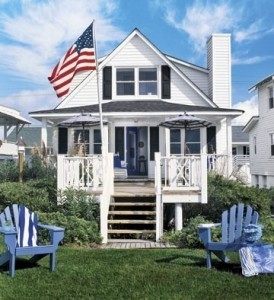 At one point in the interview, Marilyn turned to me and said, "So what are dreams for you? If you're living your dream, then what do you dream about?"
At one point in the interview, Marilyn turned to me and said, "So what are dreams for you? If you're living your dream, then what do you dream about?"
It was an interesting question. If you are living your dream, then what are dreams?
I think the idea behind dreams is simply making conscious decisions and living intentionally. It's waking up every morning and making a mindful decision about what to do with the next 24 hours.
And I think it's possible to live that way now. Not just at some point off in the future.
I spent a total of four years cycling 27,000 miles with my family; three of them pedaling from Alaska to Argentina. We made it through by making conscious decisions each and every day. When times got tough, I knew turning around and going back home was an option, but I decided I wasn't ready to give up yet. Maybe I was close, but I wasn't quite at the quitting point yet.
Now that we're living in Idaho, we're living exactly the same. Each and every morning we wake up and decide what we'll do with that day. If, at some point, we wake up and feel that our needs will be better met somewhere else, then we'll move on.
Unfortunately, American culture and society tells us that we need to toe the line and live a certain way. We are expected to want the white picket fence and two cars in the driveway. Having the security of a well-paying job should bring us enormous amounts of satisfaction.
And if it's doesn't, then there must be something wrong with us. I beg to differ.
We can define our own American Dream. We can choose what kind of life we want to live. We can break free from the trappings of modern society that tell us we should want something we don't.
We can live intentionally and purposely. We can make those choices. We can live the dream.
If you want to live the life of your dreams but aren't sure how, please join me for a 3-month dream intensive boot camp to get you over the major hurdles and well on your way to living the way you want. Join The Dream Intensive at www.youcandreambigdreams.com
Original article can be found here: What are dreams? And can we live them?
March 12, 2012
The promise of travel
Vagablogging :: Rolf Potts Vagabonding Blog
Travel is an iterative process of experiencing, ruminating, and growing – with the growth often occurring long after we've returned from our adventures. Through the sites and sounds and smells of the unfamiliar we test our assumptions and lose the loosest notions of our long-held beliefs. In leaving the familiar we willingly leave behind who we are for a time. By embracing the promise of travel, we embrace the unknown in ourselves and in the world: we are able to trim the mental fat and make room for alternate world-views and novel ideas, for new foods and cultures and language and experiences. You could call it gaining perspective and you wouldn't be wrong, but I find it much simpler than that. It's adding flavor to the core of our being and, to be sure, our core, who we truly are, isn't altered by vagabonding but instead is enhanced and drawn out through travel; the artist is inspired, the businessman sees opportunity, the adventurous finds challenges and the lovers feel romanced. By shedding pounds of preconceived notions about the world, its peoples, and our place in relation to them, we are undertaking a journey of the utmost significance. This is the promise of travel; a literal and figurative exploration of both self and of the world with the discovery being a unique experience to all.
Original article can be found here: The promise of travel
Paul Theroux on the merits on overland travel
Vagablogging :: Rolf Potts Vagabonding Blog
"Travel is a transition, and at its best is a journey that begins with setting forth from home. I hated parachuting in to a place. I needed to be able to link one place to another. One of the problems I had with travel in general was the ease with which a person could be transported so swiftly from the familiar to the strange, the moon shot whereby the New York office worker, say, is insinuated overnight into the middle of Africa to gape at gorillas. That was just a way of feeling foreign. The other way, going slowly, crossing national frontiers, scuttling past razor wire with my bag and my passport, was the best way of being reminded that there was a relationship between Here and There, and that a travel narrative was the story of There and Back.
–Paul Theroux, Dark Star Safari: Overland from Cairo to Capetown (2003)
(2003)
Original article can be found here: Paul Theroux on the merits on overland travel
March 10, 2012
Introducing BootsnAll's Around the World Airfare Report
Vagablogging :: Rolf Potts Vagabonding Blog
Back in January I wrote a post about our efforts over at BootsnAll to make shopping for and purchasing a round the world ticket easier. I explained the round the world flight research project that we were working on – where we shopped three fictional itineraries among eight different companies who sell round the world plane tickets. Just this past week we published a free, downloadable report presenting our findings.
Download the free Around the World Airfare Report
We first published short RTW ticket reviews over on our sister site Round the World Ticket. We broke down our shopping experiences for each company based on five different criteria: price, search options,customer service, date flexibility, and route flexibility.
But we wanted to take it a step further. We wanted to build a resource for potential RTW travelers that would save them hours upon hours of research. We spent a good portion of November and December shopping these prices, doing research, and trying to break down the main options that travelers have for taking a RTW trip.
When my wife and I took our RTW trip back in 2008-2009, we were completely overwhelmed by the options available and the complexity of the rules associated with certain tickets. It was a frustrating experience, and we honestly just wanted someone else to explain it to us in layman's terms.
After doing the research, we found out that there really isn't a best option. Best depends on each traveler and his or her situation. That's what this around the world airfare report is all about. It's not meant to tell you what to do. It simply gives you the information you need to know to make the most informed decision possible.
Since trends change, companies go out of business, new companies emerge, and prices are always fluctuating, this isn't the end of this research. We plan on updating this report three to four times a year to stay on top of the changes in the industry. This first time around, we hoped to highlight the biggest, most popular options out there. But we know that there are more than just these eight options available for long-term travelers. We plan on delving into those as well.
So go ahead and download this report and let us know what you think. What did we do well? What did we do poorly? What would you like to see on the next report? Comment below to share your thoughts and opinions. If you've used any of these companies for your own trip, go ahead and leave a review of your RTW experience.
Original article can be found here: Introducing BootsnAll's Around the World Airfare Report
Rolf Potts's Blog
- Rolf Potts's profile
- 323 followers



